| University | Kaplan University (KU) |
| Subject | Introduction to Management |
Learning Objectives
LO 1 Discuss how teams can contribute to an organization’s effectiveness
LO 2 Distinguish the new team environment from that of traditional work groups
LO 3 Summarize how groups become teams
LO 4 Explain why groups sometimes fail
LO 5 Describe how to build an effective team
LO 6 List methods for managing a team’s relationships with other teams
LO 7 Identify ways to manage conflict
Hire a Professional Essay & Assignment Writer for completing your Academic Assessments
Native Singapore Writers Team
- 100% Plagiarism-Free Essay
- Highest Satisfaction Rate
- Free Revision
- On-Time Delivery
Teams & Work Group Environment
Teams :
- A small number of people with complementary skills who are committed to a common purpose, a set of performance goals, and an approach for which they hold themselves mutually accountable
Work Group :
- Members of a work group are held accountable for individual work, but they are not responsible for the output of the entire work group
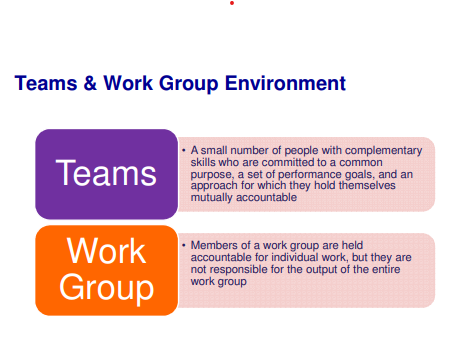
Benefits of Teams
1) . Costs and productivity – In teams, fewer supervisors are needed, thus cost
savings. Companies can also expand the capabilities of team members &
reduce the total no. of employees needed, thus increased productivity
2). Quality improvements – Teams can work like quality circles and strive for
continuous improvement to improve quality in products and services
3). Speed – In a team, when one member is on vacation or medical leave, the
other members can respond to customer queries, thus speed is maintained.
4). Innovation – Two or more brains are better than one, thus teams are more
innovative
Types of Teams
Project Teams :
- Work full-time on a specific project that Project Teams has a beginning and an end
Parallel Teams:
- Focus on a problem or issue that requires only part-time commitment from team members
Transnational/ Virtual Teams:
- Interact electronically on problems that require a part-time commitment from team members
Self-Managed Teams
- Responsible for producing an entire product, component or service
- Team members need technical skills, management skills & Interpersonal skills
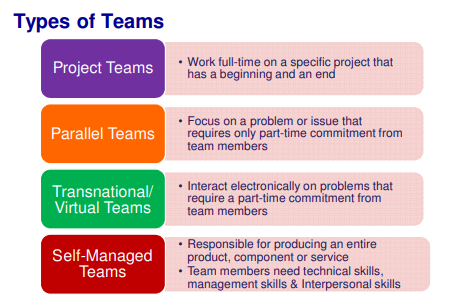
Buy Custom Answer of This Assessment & Raise Your Grades
Types of Teams
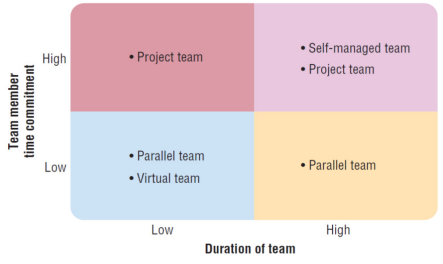
Managing Team Performance
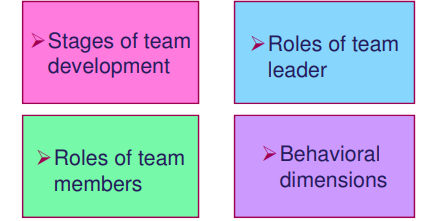
Stages of Team Development
- Forming
-Team members attempt to lay the ground rules for what types of behavior are
acceptable. - Storming
-Hostilities and conflict arise, and people jockey for positions of power and status. - Norming
-Team members agree on their shared goals, and norms and closer relationships develop. - Performing
-Team members channels its energies into performing its tasks. - Adjourning
-Disband. Disperse as a group.
The Role of the Team Leader
- Provide feedback to team members
- Express shared vision
- Support team members
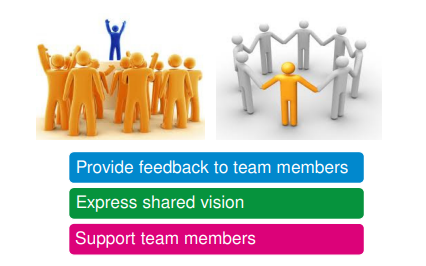
Role of Team Members
Taskfacilitating:
- Direction giving, information seeking, information giving, coordinating, summarizing
Relationship building:
- Supporting, harmonizing, tension relieving, energizing, facilitating
Behavioral dimensions
Cohesiveness
Norms
Cooperation
Interdependence
Trust
Types of Interdependence
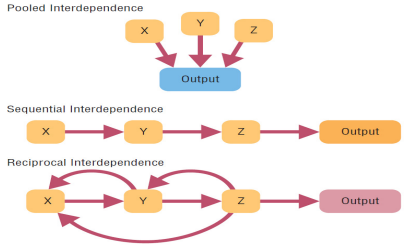
cta_quetion_2
Team Performance Problems
Free riders – Working less hard and being less productive when in a team.
The non-conforming high performer – A self centered person who wants to do all the work and may want to take all the credit and reward
Lack of rewards for teamwork – If there are lack of rewards, the entire team may not be motivated to achieve goals
Team Management Skills
- Conflict management
-Functional conflict (Take-in and give out)
-Dysfunctional conflict(Bad conflict)
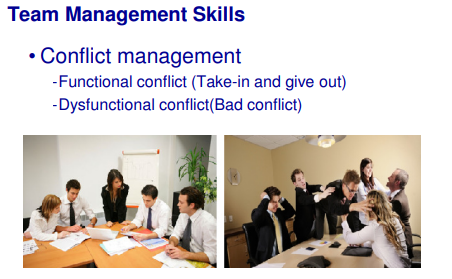
Conflict Handling Styles
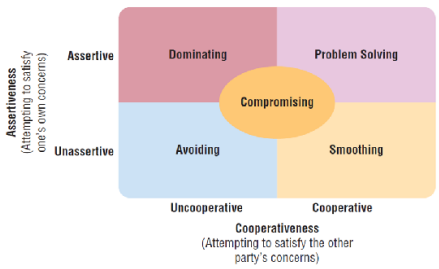
Negotiation
- Win-win style
- Win-lose style
Superordinate goals
- Higher-level goals taking priority over specific individual or group goals.
Tutorial: Group Discussion Questions
1. Define teams in organisations?
2. Explain the major difference between teams and workgroups.
3. In contemporary organizations, there are several possibilities of team structures. Discuss FOUR
(4) types of teams with an example each.
Stuck with a lot of homework assignments and feeling stressed ? Take professional academic assistance & Get 100% Plagiarism free papers
Are you facing challenges with your Introduction to Management Assignment related to ITM Bridging Topic 10 - Managing Teams? Our expert team is ready to assist you! With our Singapore assignment writing help, you can easily buy assignments from subject specialists who deliver quality work tailored to your requirements. We also provide case study writing services to support your learning journey. Let us help you achieve your academic goals—get in touch today!
Looking for Plagiarism free Answers for your college/ university Assignments.
- EGH222 Healthcare Analytics Assignment 2: Predictive Model for Sick Days Based on Employee Demographics and Lifestyle Data
- Sustainability Strategy Assignment: Selected Company Case Study on Addressing Sector Challenges and Driving Behavioural Change Campaigns
- 7WBS2012 Executive Career Development Assignment: Career Pathway & Readiness Post-MBA in Education Management
- CVE2322 Gantry Build Prototype Assignment: Sustainable Civil Engineering Model Using Recyclable Materials
- BMG706 Strategic Quality Change Assignment Report: Enhancing Operational Excellence at any Organization
- CVE2323 Structural Analysis Assignment: Matrix Method & STAAD.Pro Evaluation of Frame Systems
- BMK3015 Major Project Assignment: Customer-Centric Design Solutions Using Research & Project Management
- Wellbeing Assignment: University Students’ Perspectives for Improving Mental Health Support
- BCLO001 Business Statistics Assignment: Analysis of Exercise Duration Among Singaporean Students
- BM4364 Customer Experience Assignment: Evaluating CX Practices Through Employee Insights in the Service Industry

